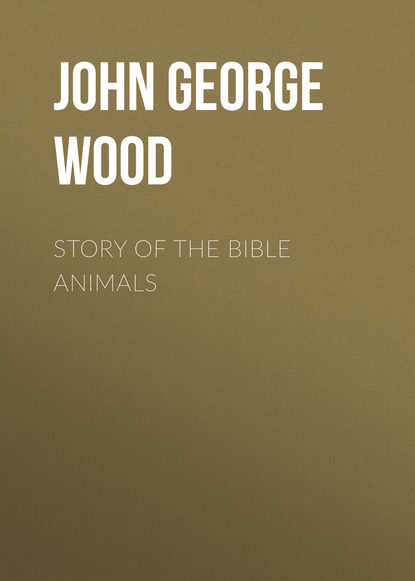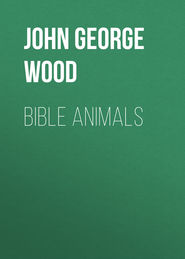По всем вопросам обращайтесь на: info@litportal.ru
(©) 2003-2024.
✖
Story of the Bible Animals
Настройки чтения
Размер шрифта
Высота строк
Поля
The word Jachmur evidently represents a species of antelope—Resemblance of the animal to the ox tribe—Its ox-like horns and mode of attack—Its capability of domestication—Former and present range of the Bubale—Its representation on the monuments of ancient Egypt—Delicacy of its flesh—Size and general appearance of the animal.
It has already been mentioned that in the Old Testament there occur the names of three or four animals, which clearly belong to one or other of three or four antelopes. Only one of these names now remains to be identified. This is the Jachmur, or Yachmur, a word which has been rendered in the Septuagint as Boubalos, and has been translated in our Authorized Version as Fallow Deer.
We shall presently see that the Fallow Deer is to be identified with another animal, and that the word Jachmur must find another interpretation. If we follow the Septuagint, and call it the Bubale, we shall identify it with a well-known antelope called by the Arabs the "Bekk'r-el-Wash," and known to zoologists as the Bubale (Acronotus bubalis).
This fine antelope would scarcely be recognised as such by an unskilled observer, as in its general appearance it much more resembles the ox tribe than the antelope. Indeed, the Arabic title, "Bekk'r-el-Wash," or Wild Cow, shows how close must be the resemblance to the oxen. The Arabs, and indeed all the Orientals in whose countries it lives, believe it not to be an antelope, but one of the oxen, and class it accordingly.
How much the appearance of the Bubale justifies them in this opinion may be judged by reference to the figure on page 143. The horns are thick, short, and heavy, and are first inclined forwards, and then rather suddenly bent backwards. This formation of the horns causes the Bubale to use his weapons after the manner of the bull, thereby increasing the resemblance between them. When it attacks, the Bubale lowers its head to the ground, and as soon as its antagonist is within reach, tosses its head violently upwards, or swings it with a sidelong upward blow. In either case, the sharp curved horns, impelled by the powerful neck of the animal, and assisted by the weight of the large head, become most formidable weapons.
It is said that in some places, where the Bubales have learned to endure the presence of man, they will mix with his herds for the sake of feeding with them, and by degrees become so accustomed to the companionship of their domesticated friends, that they live with the herd as if they had belonged to it all their lives. This fact shows that the animal possesses a gentle disposition, and it is said to be as easily tamed as the gazelle itself.
Even at the present day the Bubale has a very wide range, and formerly had in all probability a much wider. It is indigenous to Barbary, and has continued to spread itself over the greater part of Northern Africa, including the borders of the Sahara, the edges of the cultivated districts, and up the Nile for no small distance. In former days it was evidently a tolerably common animal of chase in Upper Egypt as there are representations of it on the monuments, drawn with the quaint truthfulness which distinguishes the monumental sculpture of that period.
THE BUBALE, OR FALLOW-DEER OF SCRIPTURE.
It is probable that in and about Palestine it was equally common, so that there is good reason why it should be specially named as one of the animals that were lawful food. Not only was its flesh permitted to be eaten, but it was evidently considered as a great dainty, inasmuch as the Jachmur is mentioned in 1 Kings iv. 23 as one of the animals which were brought to the royal table. "Harts and Roebucks and Fallow-Deer" are the wild animals mentioned in the passage alluded to.
THE SHEEP
Importance of Sheep in the Bible—The Sheep the chief wealth of the pastoral tribes—Arab shepherds of the present day—Wanderings of the flocks in search of food—Value of the wells—How the Sheep are watered—The shepherd usually a part owner of the flocks—Structure of the sheepfolds—The rock caverns of Palestine—David's adventure with Saul—Use of the dogs—The broad-tailed Sheep, and its peculiarities.
We now come to a subject which will necessarily occupy us for some little time.
There is, perhaps, no animal which occupies a larger space in the Scriptures than the Sheep. Whether in religious, civil, or domestic life, we find that the Sheep is bound up with the Jewish nation in a way that would seem almost incomprehensible, did we not recall the light which the New Testament throws upon the Old, and the many allusions to the coming Messiah under the figure of the Lamb that taketh away the sins of the world.
In treating of the Sheep, it will be perhaps advisable to begin the account by taking the animal simply as one of those creatures which have been domesticated from time immemorial, dwelling slightly on those points on which the sheep-owners of the old days differed from those of our own time.
The only claim to the land seems, in the old times of the Scriptures, to have lain in cultivation, or perhaps in the land immediately surrounding a well. But any one appears to have taken a piece of ground and cultivated it, or to have dug a well wherever he chose, and thereby to have acquired a sort of right to the soil. The same custom prevails at the present day among the cattle-breeding races of Southern Africa. The banks of rivers, on account of their superior fertility, were considered as the property of the chiefs who lived along their course, but the inland soil was free to all.
Had it not been for this freedom of the land, it would have been impossible for the great men to have nourished the enormous flocks and herds of which their wealth consisted; but, on account of the lack of ownership of the soil, a flock could be moved to one district after another as fast as it exhausted the herbage, the shepherds thus unconsciously imitating the habits of the gregarious animals, which are always on the move from one spot to another.
Pasturage being thus free to all, Sheep had a higher comparative value than is the case with ourselves, who have to pay in some way for their keep. There is a proverb in the Talmud which may be curtly translated, "Land sell, sheep buy."
The value of a good pasture-ground for the flocks is so great, that its possession is well worth a battle, the shepherds being saved from a most weary and harassing life, and being moreover fewer in number than is needed when the pasturage is scanty Sir S. Baker, in his work on Abyssinia, makes some very interesting remarks upon the Arab herdsmen, who are placed in conditions very similar to those of the Israelitish shepherds.
ARABS JOURNEYING TO FRESH PASTURES.
"The Arabs are creatures of necessity; their nomadic life is compulsory, as the existence of their flocks and herds depends upon the pasturage. Thus, with the change of seasons they must change their localities according to the presence of fodder for their cattle.... The Arab cannot halt in one spot longer than the pasturage will support his flocks. The object of his life being fodder, he must wander in search of the ever-changing supply. His wants must be few, as the constant change of encampment necessitates the transport of all his household goods; thus he reduces to a minimum his domestic furniture and utensils....
"This striking similarity to the descriptions of the Old Testament is exceedingly interesting to a traveller when residing among these curious and original people. With the Bible in one's hand, and these unchanged tribes before the eyes, there is a thrilling illustration of the sacred record; the past becomes the present, the veil of three thousand years is raised, and the living picture is a witness to the exactness of the historical description. At the same time there is a light thrown upon many obscure passages in the Old Testament by the experience of the present customs and figures of speech of the Arabs, which are precisely those that were practised at the periods described....
VIEW OF THE PYRAMIDS.
"Should the present history of the country be written by an Arab scribe, the style of the description would be precisely that of the Old Testament. There is a fascination in the unchangeable features of the Nile regions. There are the vast pyramids that have defied time, the river upon which Moses was cradled in infancy, the same sandy desert through which he led his people, and the watering-places where their flocks were led to drink. The wild and wandering Arabs, who thousands of years ago dug out the wells in the wilderness, are represented by their descendants, unchanged, who now draw water from the deep wells of their forefathers, with the skins that have never altered their fashion.
"The Arabs, gathering with their goats and sheep around the wells to-day, recall the recollection of that distant time when 'Jacob went on his journey, and came into the land of the people of the east. And he looked, and behold a well in the field, and lo! there were three flocks of sheep lying by it,' &c. The picture of that scene would be an illustration of Arab daily life in the Nubian deserts, where the present is a mirror of the past."
Owing to the great number of Sheep which they have to tend, and the peculiar state of the country, the life of the shepherd in Palestine is even now very different from that of an English shepherd, and in the days of the early Scriptures the distinction was even more distinctly marked.
Sheep had to be tended much more carefully than we generally think. In the first place, a thoughtful shepherd had always one idea before his mind,—namely, the possibility of obtaining sufficient water for his flocks. Even pasturage is less important than water, and, however tempting a district might be, no shepherd would venture to take his charge there if he were not sure of obtaining water. In a climate such as ours, this ever-pressing anxiety respecting water can scarcely be appreciated, for in hot climates not only is water scarce, but it is needed far more than in a temperate and moist climate. Thirst does its work with terrible quickness, and there are instances recorded where men have sat down and died of thirst in sight of the river which they had not strength to reach.
In places therefore through which no stream runs, the wells are the great centres of pasturage, around which are to be seen vast flocks extending far in every direction. These wells are kept carefully closed by their owners, and are only opened for the use of those who are entitled to water their flocks at them.
Noontide is the general time for watering the Sheep, and towards that hour all the flocks may be seen converging towards their respective wells, the shepherd at the head of each flock, and the Sheep following him. See how forcible becomes the imagery of David, the shepherd poet, "The Lord is my Shepherd; I shall not want. He maketh me to lie down in green pastures (or, in pastures of tender grass): He leadeth me beside the still waters" (Ps. xxiii. 1, 2). Here we have two of the principal duties of the good shepherd brought prominently before us,—namely, the guiding of the Sheep to green pastures and leading them to fresh water. Very many references are made in the Scriptures to the pasturage of sheep, both in a technical and a metaphorical sense; but as our space is limited, and these passages are very numerous, only one or two of each will be taken.
In the story of Joseph, we find that when his father and brothers were suffering from the famine, they seem to have cared as much for their Sheep and cattle as for themselves, inasmuch as among a pastoral people the flocks and herds constitute the only wealth. So, when Joseph at last discovered himself, and his family were admitted to the favour of Pharaoh, the first request which they made was for their flocks. "Pharaoh said unto his brethren, What is your occupation? And they said unto Pharaoh, Thy servants are shepherds, both we, and also our fathers.
"They said moreover unto Pharaoh, For to sojourn in the land are we come; for thy servants have no pasture for their flocks; for the famine is sore in the land of Canaan: now therefore, we pray thee, let thy servants dwell in the land of Goshen."
This one incident, so slightly remarked in the sacred history, gives a wonderfully clear notion of the sort of life led by Jacob and his sons. Forming, according to custom, a small tribe of their own, of which the father was the chief, they led a pastoral life, taking their continually increasing herds and flocks from place to place as they could find food for them. For example, at the memorable time when the story of Joseph begins, he was sent by his father to his brothers, who were feeding the flocks, and he wandered about for some time, not knowing where to find them. It may seem strange that he should be unable to discover such very conspicuous objects as large flocks of sheep and goats, but the fact is that they had been driven from one pasture-land to another, and had travelled in search of food all the way from Shechem to Dothan.
In 1 Chron. iv. 39, 40, we read of the still pastoral Israelites that "they went to the entrance of Gedor, even unto the east side of the valley, to seek pasture for their flocks. And they found fat pasture and good, and the land was wide, and quiet, and peaceable."
How it came to be quiet and peaceable is told in the context. It was peaceable simply because the Israelites were attracted by the good pasturage, attacked the original inhabitants, and exterminated them so effectually that none were left to offer resistance to the usurpers. And we find from this passage that the value of good pasture-land where the Sheep could feed continually without being forced to wander from one spot to another was so considerable, that the owners of the flocks engaged in war, and exposed their own lives, in order to obtain so valuable a possession.
JACOB MEETS RACHEL AT THE WELL.
We will now look at one or two of the passages that mention watering the Sheep—a duty so imperative on an Oriental shepherd, and so needless to our own.
In the first place we find that most graphic narrative which occurs in Gen. xxix. to which a passing reference has already been made. When Jacob was on his way from his parents to the home of Laban in Padan-aram, he came upon the very well which belonged to his uncle, and there saw three flocks of Sheep lying around the well, waiting until the proper hour arrived. According to custom, a large stone was laid over the well, so as to perform the double office of keeping out the sand and dust, and of guarding the precious water against those who had no right to it. And when he saw his cousin Rachel arrive with the flock of which she had the management, he, according to the courtesy of the country and the time, rolled away the ponderous barrier, and poured out water into the troughs for the Sheep which Rachel tended.
EASTERN SHEPHERD WATCHING HIS FLOCK.
About two hundred years afterwards, we find Moses performing a similar act. When he was obliged to escape into Midian on account of his fatal quarrel with a tyrannical Egyptian, he sat down by a well, waiting for the time when the stone might be rolled away, and the water be distributed. Now it happened that this well belonged to Jethro, the chief priest of the country, whose wealth consisted principally of Sheep. He entrusted his flock to the care of his seven daughters, who led their Sheep to the well and drew water as usual into the troughs. Presuming on their weakness, other shepherds came and tried to drive them away, but were opposed by Moses, who drove them away, and with his own hands watered the flock.
Now in both these examples we find that the men who performed the courteous office of drawing the water and pouring it into the sheep-troughs married afterwards the girl to whose charge the flocks had been committed. This brings us to the Oriental custom which has been preserved to the present day.
The wells at which the cattle are watered at noon-day are the meeting-places of the tribe, and it is chiefly at the well that the young men and women meet each other. As each successive flock arrives at the well, the number of the people increases, and while the sheep and goats lie patiently round the water, waiting for the time when the last flock shall arrive, and the stone be rolled off the mouth of the well, the gossip of the tribe is discussed, and the young people have ample opportunity for the pleasing business of courtship.
As to the passages in which the wells, rivers, brooks, water-springs, are spoken of in a metaphorical sense, they are too numerous to be quoted.
And here I may observe, that in reality the whole of Scripture has its symbolical as well as its outward signification; and that, until we have learned to read the Bible strictly according to the spirit, we cannot understand one-thousandth part of the mysteries which it conceals behind its veil of language; nor can we appreciate one-thousandth part of the treasures of wisdom which lie hidden in its pages.
Another duty of the shepherd of ancient Palestine was to guard his flock from depredators, whether man or beast. Therefore the shepherd was forced to carry arms; to act as a sentry during the night; and, in fact, to be a sort of irregular soldier. A fully-armed shepherd had with him his bow, his spear, and his sword, and not even a shepherd lad was without his sling and the great quarter-staff which is even now universally carried by the tribes along the Nile—a staff as thick as a man's wrist, and six or seven feet in length. He was skilled in the use of all these weapons, especially in that of the sling.
DAVID GATHERS STONES FROM THE BROOK TO CAST AT GOLIATH.
In these days, the sling is only considered as a mere toy, whereas, before the introduction of fire-arms, it was one of the most formidable weapons that could be wielded by light troops. Round and smooth stones weighing three or four ounces were the usual projectiles, and, by dint of constant practice from childhood, the slingers could aim with a marvellous precision. Of this fact we have a notable instance in David, who knew that the sling and the five stones in the hand of an active youth unencumbered by armour, and wearing merely the shepherd's simple tunic, were more than a match for all the ponderous weapons of the gigantic Philistine.
It has sometimes been the fashion to attribute the successful aim of David to a special miracle, whereas those who are acquainted with ancient weapons know well that no miracle was wrought, because none was needed; a good slinger at that time being as sure of his aim as a good rifleman of our days.
The sling was in constant requisition, being used both in directing the Sheep and in repelling enemies: a stone skilfully thrown in front of a straying Sheep being a well-understood signal that the animal had better retrace its steps if it did not want to feel the next stone on its back.
AN EASTERN SHEPHERD.
Passing his whole life with his flock, the shepherd was identified with his Sheep far more than is the case in this country. He knew all his Sheep by sight, he called them all by their names, and they all knew him and recognised his voice. He did not drive them, but he led them, walking in their front, and they following him. Sometimes he would play with them, pretending to run away while they pursued him, exactly as an infant-school teacher plays with the children.
Consequently, they looked upon him as their protector as well as their feeder, and were sure to follow wherever he led them.










